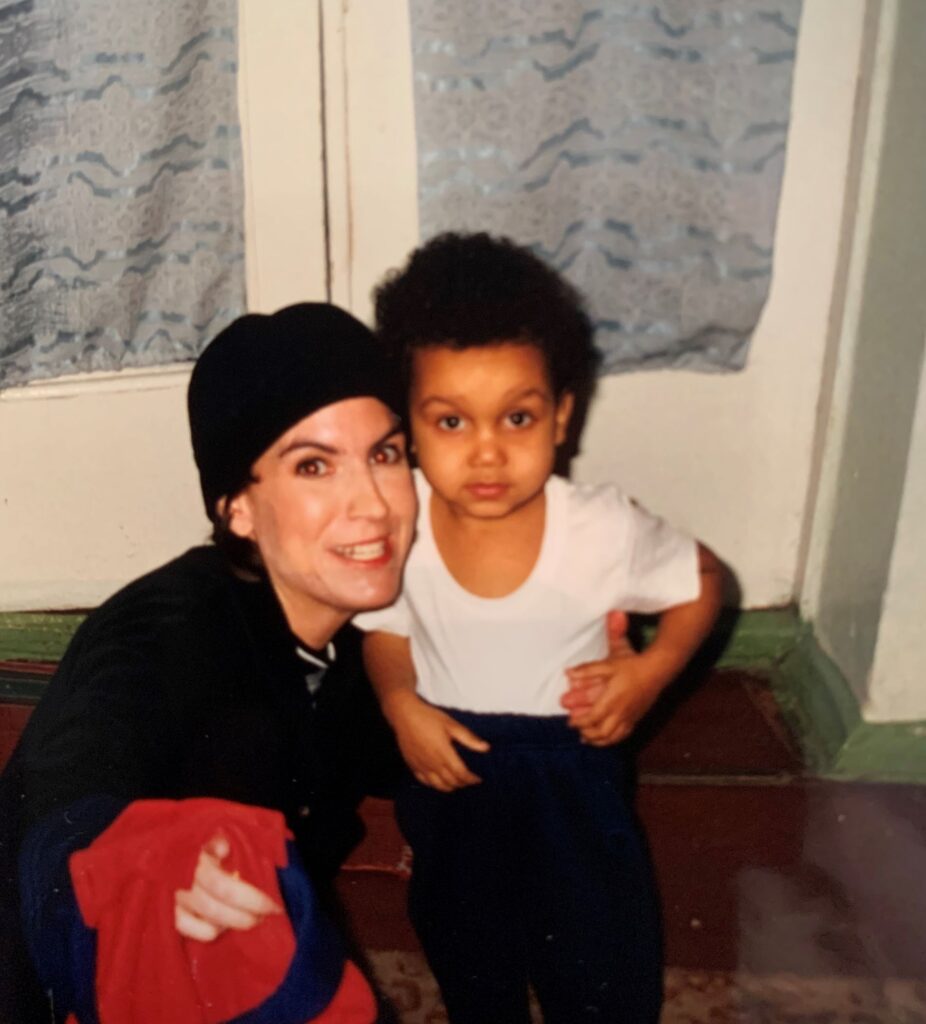
Dale and I had been awake for approximately 23 hours when we visited the orphanage. The U.S. INS, as it was called at the time, required you to request permission to bring a specific number of orphaned children back into the county, and we had requested to bring two. They were smart to require that decision before you leave. Otherwise you might return with ten children and the best of intentions, if not the ability, to effectively parent all ten.
We took a thirteen-hour train ride to the orphanage. Various children were brought in to meet us. There was a baby, a couple of two-year olds, and then finally, what they declared, “the healthiest, smartest and best boy in the whole orphanage.” This last boy, who eventually became our son, was nearly four years old, 31 inches tall and weighed 30 lbs. He was teeny-tiny. Also, he was mixed race. They explained his biological parents were students – his bio father most likely a medical student from Africa.
He was the oldest in an orphanage that was supposed to hold infants to two-year olds. It soon became apparent why he wasn’t adopted along with his same age peers. This European country wasn’t comfortable with people who didn’t look like them.
We learned this as we walked down the street with our new son. They would point, stop, talk to our interpreter. We would hear “Mulat! Mulat!” ‘Silly Ukranians’, I thought. “We aren’t like that in America,” I would explain to our interpreter.
Dale and I had no struggle in determining who would eventually become our sons when we met all the children. They essentially chose us. While the other children would come in, they would be so happy to enjoy the attention of their primary caregiver, as well as the orphanage doctor and director. They never had all three to themselves.
I had said a prayer before meeting the children, asking to have them choose us rather than us choose them, because that seemed too awful and terrible a task. Thankfully, our two sons never broke eye contact with us. Thad wanted to be held by us. Ethan was completely smitten with Dale, never taking his eyes off him.
As I said, we were exhausted. We thanked the director for her time, said we were going to go to our room, sleep on it and call the next day with our plans. Lying in our cots, we discussed the children. Dale said, “I want to adopt the older boy, the Black child. Even if you don’t want to, I’ll take him and raise him myself.” His voice was cracking as he said this. I said, “I would like to adopt him too.” We also decided we wanted to adopt our younger son, Thad, we called him, “the angry one,” because he looked very angry at us for making him wait so long to get him.
After this very important discussion, I kind of laughed as I said, “you know, you can’t get into a fistfight if anyone ever says anything racist.”
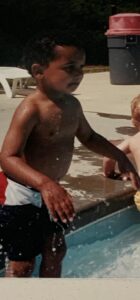
Ethan splashing in the pool.
I look back at that moment, when I thought anyone saying anything racist was such a remote possibility, it was almost laughable. I was so naïve, so convicted that racism ended in the 60s. These foreigners who wouldn’t adopt my son, because he didn’t share their race were just so far behind where we Americans were. I took that conviction with me every time someone said anything about Ethan, and everyone there had something to say. We quickly learned the term “mulat” as we heard it over and over again, from strangers on the street, to doctors, lawyers and everyone engaged in the adoption process.
“Their parents will be very angry,” our interpreter was told by nearly everyone. “It’s not too late, you can return him,” was also a most unwelcome suggestion from a doctor examining him. The racism was pervasive and egregious. Always, we responded with how things were different in America. We aren’t like that in the U.S. Always, we were met with puzzled, disbelieving expressions.
We took our firm beliefs in a post-racial society, and we flew home. Our first few months back in the States were idyllic. I belonged to a bible study that brought meals to us every night for a most wonderful stretch of days. The boys were showered with gifts. It was Christmastime. Life was beautiful.
A couple little droplets of racism came our way. A family friend made a comment, a little comment, the kind you can back out of quickly if you needed to. An older relative said something. We chalked it up to him being old and not understanding things were different now. We didn’t let it bother us at all. We were our own little happy family for a few months. Then, my husband began working in North Carolina, Monday through Friday. We would be joining him once our house sold in Pennsylvania and we found a new one in N.C. It was all a blur for me. I had just become a parent, then was a single parent Monday through Friday, had a house on the market and then moved. Still, I never gave our family’s interracial status much thought.
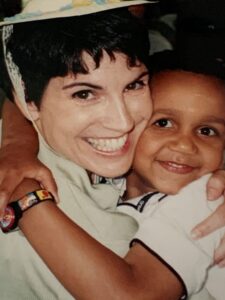
Ethan at a Preschool event. He had made my hat for me.
We moved to Cary, NC. Cary is said to be an acronym for “Containment area for Relocated Yankees.” We lived on a brand-new street with twenty homes, everyone was from somewhere else—CA, WI, TX, OH. We were our own little melting pot. Interestingly, there was only one family in the neighborhood that wasn’t white. Years later, when I recounted some of things that happened while we were in Cary, the person I was speaking with wasn’t surprised at all. “There’s a reason everyone was white.” She said, “They all wanted to live somewhere where there were only white people.” Lesson learned, a little too late but still learned.
So, what happened? The interesting thing is, some of it could be chalked up to me being “too sensitive.” Maybe, my Black son was too rambunctious, “too aggressive.” I’ll share some of the moments with you, and you be the judge.
The toughest things were the birthday parties. We lived on a street with nearly twenty boys. There were several who were Ethan’s age, six at the time the birthday invitations ended for him. One day, we were driving out of our street as I saw several mothers with their sons who were Ethan’s age. They each were carrying a gift and heading to a neighbor’s house. ‘Oh no!’ I thought. “I forgot, (let’s call him Rick,) Rick’s birthday.” This would not have surprised me. I was still very much in overwhelmed mother mode. Rick and Ethan and all the boys played together outside every day. Rick had been to all of Ethan’s birthday parties.
Clearly, I had messed up. I called the mother, let’s call her Belle. ‘Belle, I’m so sorry. I saw everyone walking up for Rick’s birthday, and I apologize. I must have completely missed it. I will drop something off tomorrow.” “There’s nothing to apologize for,” she said, “you didn’t miss anything.” Yikes. That was perhaps one of my most awkward and dumb moments. It just didn’t occur to me that he would have been excluded when every other child his age was invited.
Then, a few months later, the boy across the street was also turning six. A new boy, the same age, had just moved on the street three weeks earlier. Even he was invited to the birthday party being held outside, on their front lawn, where Ethan could watch and not understand why he wasn’t invited. A few years ago, I looked up this boy up on Facebook. His profile was him doing the white power sign.
There was the woman at the pool who appointed herself my son’s personal lifeguard and babysitter from hell. I would see her approach Ethan and start yelling at him. I would immediately intervene, “what is the problem? “He is splashing water!” “Yes, we are at a pool. ALL the kids are splashing water.” I would explain. “He is splashing harder than the others.” She would reply. After several incidents like this, I explained to her she was not allowed to speak to my son. She would need to complain to me about anything.
A few days later, she told me my son had said a bad word. “He did?” I asked. I was surprised; this would have been the first time. “What did he say?” I asked. She wouldn’t answer and wouldn’t answer. I told her I didn’t believe her if she wasn’t willing to tell me, an adult, what my son had said. “The C word,” she finally answered. “You think my five-year-old son just said the C word??? Are you kidding me???!” I would have believed pretty much anything else. My husband and I may on occasion, let an S word, a D word and the occasional F bomb slip, even though we were always careful to not say it in front of the kids. But the C word? The woman was on a C word – crack.
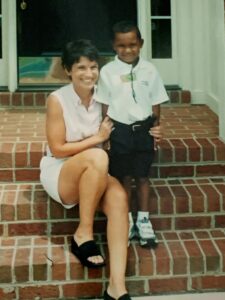
Ethan’s First Day of Kindergarten
Friends were going to be staying with us en route to visit relatives in Florida. One evening, as the wife was cleaning up some baby items, she asked a rhetorical question about her toddler daughter. “Can you imagine if, (let’s call her Kitt,) Kitt dated a Black guy when she was older?” My husband, her husband and I all looked at her. The air stood still; my heart was pounding as it is now, just writing this. None of us said anything. She was already down the road in her mind with this scenario, and clearly not registering the change in room temperature, when she answered her own question, saying, “and they had little niglets.” In our home she said this. In Ethan’s home.
We had a neighbor from Louisiana. She was never outside with her kids, all the other kids and moms, preferring instead, to stay inside reading magazines and coveting all the items she couldn’t afford. The only time we saw her was when her little blonde-haired daughter would be playing with Ethan. She supervised things quite closely, as did I. I learned early that your Black son can’t be just good; he has to be perfect. They were playing with sticks one day, and her daughter fell. She wasn’t seriously hurt in any way and hadn’t been repeatedly poked with a stick the way her daughter had been doing to my son. Still, this mother carried on as though her daughter was irreparably harmed and screamed in no uncertain terms that my son “should just go home!”
This woman’s husband lost his job during the dot.com bubble. Half the men on our mostly stay at home mom street had lost their jobs. It was a terrible time when many had to relocate. This woman’s husband got a job at a local university. “You must be so relieved,” I said to her upon hearing the news. “Not really,” she responded, “now I’m never going to be rich.” So, there’s that.
A preschool teacher found so many things wrong with my son – he didn’t clean up, didn’t follow instructions, didn’t (and she said this,) color inside the lines. When we applied to a private school for kindergarten, we found out she gave him a bad recommendation, which I can’t type without smiling at the ridiculousness of it. Oh, what power she must felt as she spoke to them about this child who spent his first four years in an orphanage. Bless your heart, Miss Debbie.
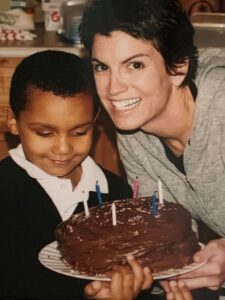
We visited various churches trying to find a church home. We are still looking for that church home. There was always something at each one – from just complete discomfort, an unwillingness to welcome my son into a preschool class, so many exchanges of glances we would have been stupid to miss. The best though, was the woman who sat completely turned around in her seat in front of us the entire service. She kept staring at Ethan with a grimace on her face. I hope she is still in that pew, because she clearly needs more Jesus.
These scenarios take you up to age six for Ethan. There would be teachers who didn’t feel he belonged in honors classes, where after I advocated for him to be enrolled, he would receive As. There would be the police stops, the dismissal from an internship because he made a white woman “uncomfortable.” There would be so much overt and covert racism to see throughout the course of his now twenty-four-year lifespan. But by the time Ethan was age six I knew I had been wrong; we were no better than those Ukrainians.



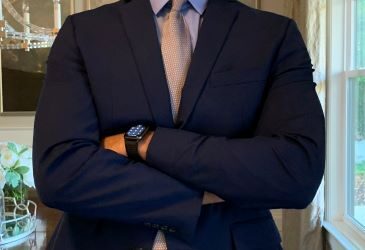
0 Comments